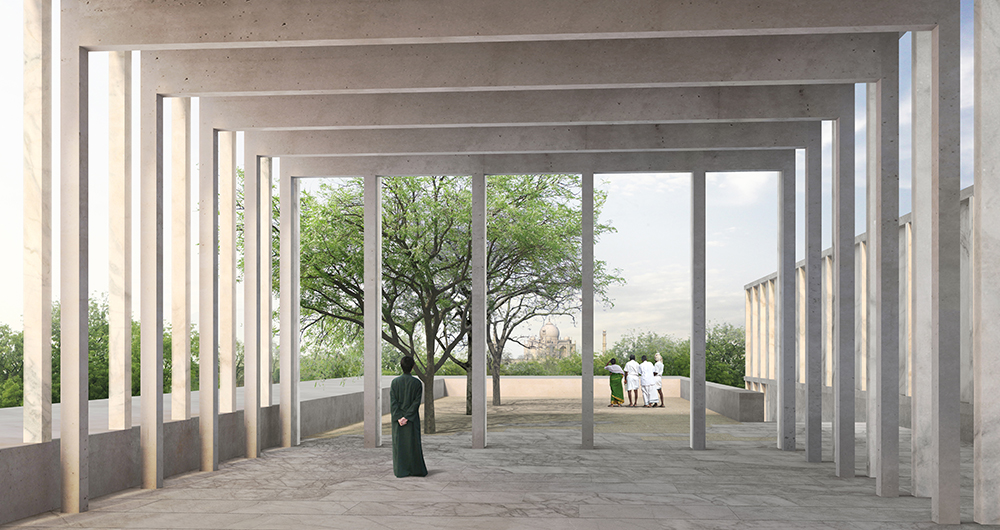Early this week, the government of the northern Indian state of Uttar Pradesh (UP) decided to change the status of a project that has been in the making since 2016: the Mughal Museum. In the city of Agra—home to the famous Mughal monument, the Taj Mahal—the museum was conceptualised to showcase the “political and cultural milestones” of the Mughal empire that ruled India for more than two centuries.
In the middle of the announcement, UP’s Chief Minister Yogi Adityanath asked, “How can our heroes be Mughals?” He, then, revealed plans to rename the museum after the Hindu ruler, Chhatrapati Shivaji Maharaj, to “invoke a feeling of nationalism and self-esteem”.
This is the latest incident of the UP government doing away with Muslims names in its cities and establishments. Historians and political scientists have been observing this erasure with alarm.
Zoya Hasan, professor emerita at the Centre for Political Studies in New Delhi-based Jawaharlal Nehru University, told VICE News that renaming a museum meant for Mughal artefacts in a city that was the seat of the empire for centuries, after a Hindu ruler “flies in the face of reason, logic and history.”
“Changing the name of the museum represents an attempt to selectively air-brush history away,” she said. “Renaming the museum cannot erase history. It can only further historical vendetta and a politics of conquest and conflict.”

Changing names of establishments, cities, streets and stations is not new to India.
After India’s Independence from British colonisation in 1947, several cities rejected distorted, colonial names. Calcutta was changed to Kolkata; Madras became Chennai; Pondicherry became Puducherry; and Bombay became Mumbai.
Hindu nationalist assertions over Islamic names gained momentum after Hindu nationalist leader and current Prime Minister Narendra Modi came to power in 2014. Behind the name change is the ruling Bharatiya Janata Party’s (BJP) version of a throwback to India’s “golden” Hindu past, which is said to have ended when the Muslims invaded. The ongoing mission to erase Islamic names is an attempt to reclaim that version of history.
Over the last two years, several states went on a name-changing spree.
UP is a Hindu majority state, with 79.73 percent Hindus, while Muslims make up 19.26 percent. CM Adityanath himself is a hardline Hindu nationalist, a priest, and member of the BJP.
One data shows that out of around 600,000 cities, towns and villages in India, as many as 704 carry names of the first six Mughal emperors viz., Babur, Humayun, Akbar, Jahangir, Shahjahan and Aurangzeb. In that, UP tops the list of modern cities bearing names of Mughal rulers.
In 2018, the Adityanath government renamed Mughalsarai railway station, an iconic transport port, to Pandit Deendayal Upadhyaya station, after a Hindu right-wing ideologue. The decision kicked off a political storm. The same year, the 400 year-plus-old name of Allahabad city, given by a Mughal ruler, was changed to Prayagraj, after a Hindu pilgrimage centre. The trend followed several streets, institutions, buildings and stations.
Historian Mridula Mukherjee told VICE News that the Hindu nationalist rhetoric of getting rid of Muslim dominance through name change goes back to the “divide and rule” policy of the British colonisers. The colonial scheme involved creating a religious divide to strengthen imperial rule, which culminated in the Partition in 1947. The Partition led to the creation of modern-day Pakistan as a Muslim nation, while India remained a secular country with a Hindu majority population.
“[The name change] goes back to that colonial mindset to divide India on communal lines,” she said. “This is not nationalism. This is communalism.”
Some BJP-ruled states have also omitted Muslim rulers from history textbooks, which many see as distortion of factual history. In the western Indian state of Gujarat—where PM Modi was the chief minister before 2014—class 9 social studies textbooks stated that Hindus are a minority, while the Muslims, Christians and Sikhs are the majority.
Historians and activists say that rewriting history in textbooks or changing names of places is dangerous, and shrinks spaces for alternative and factual histories. Sohail Hashmi, New Delhi-based historian and heritage activist, told VICE News that it takes two generations living with distorted history for the erasure to be successful.
“People who have grown up with a critical attitude towards history and the past will keep saying this is not right. But 15-20 years later, they will all be dead,” said Hashmi. “Unless the educated youth raise questions and resist, this version of the history will be carried forward.”
The Indian government’s recent policies have also been controversial and discriminatory against the Muslims. Last year, the BJP government passed the Citizenship Amendment Act (CAA), which ordained that religion could be used to determine Indian citizenship. The government is yet to implement the Act.
Mukherjee said that it’s not possible to completely erase a legacy like that of Mughals. “But [changing names] will remain desperate attempts to make ideological and political points to spread certain kinds of views and prejudices,” she said.
Hasan added, “George Orwell’s dictum that ‘he who controls the past, controls the future’ should be reread in the case of [Modi’s] regime as a warning against the pitfalls of authoritarianism and autocracy.”
Follow Pallavi Pundir on Twitter.
from VICE US https://ift.tt/2ZHw15C
via cheap web hosting
No comments:
Post a Comment